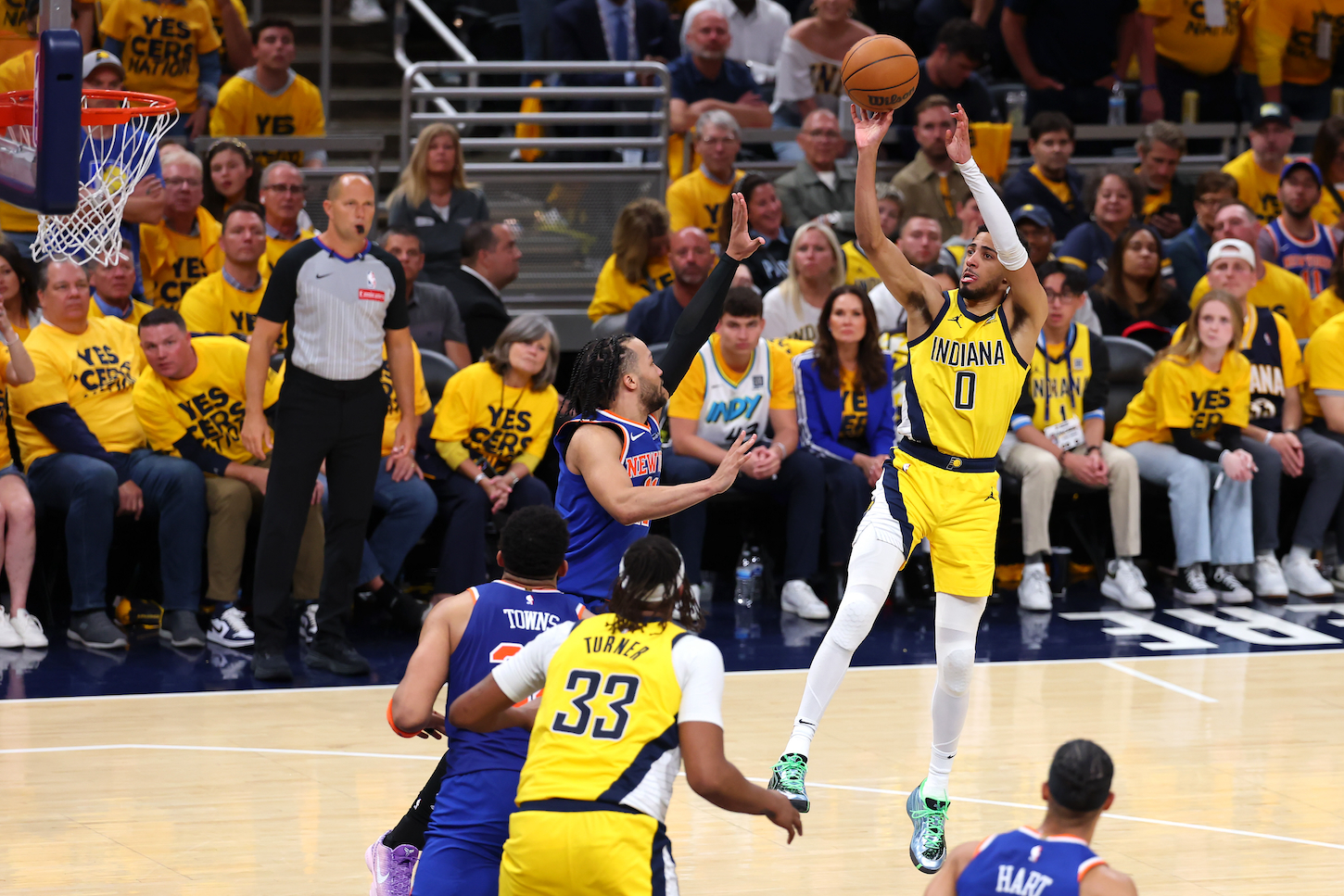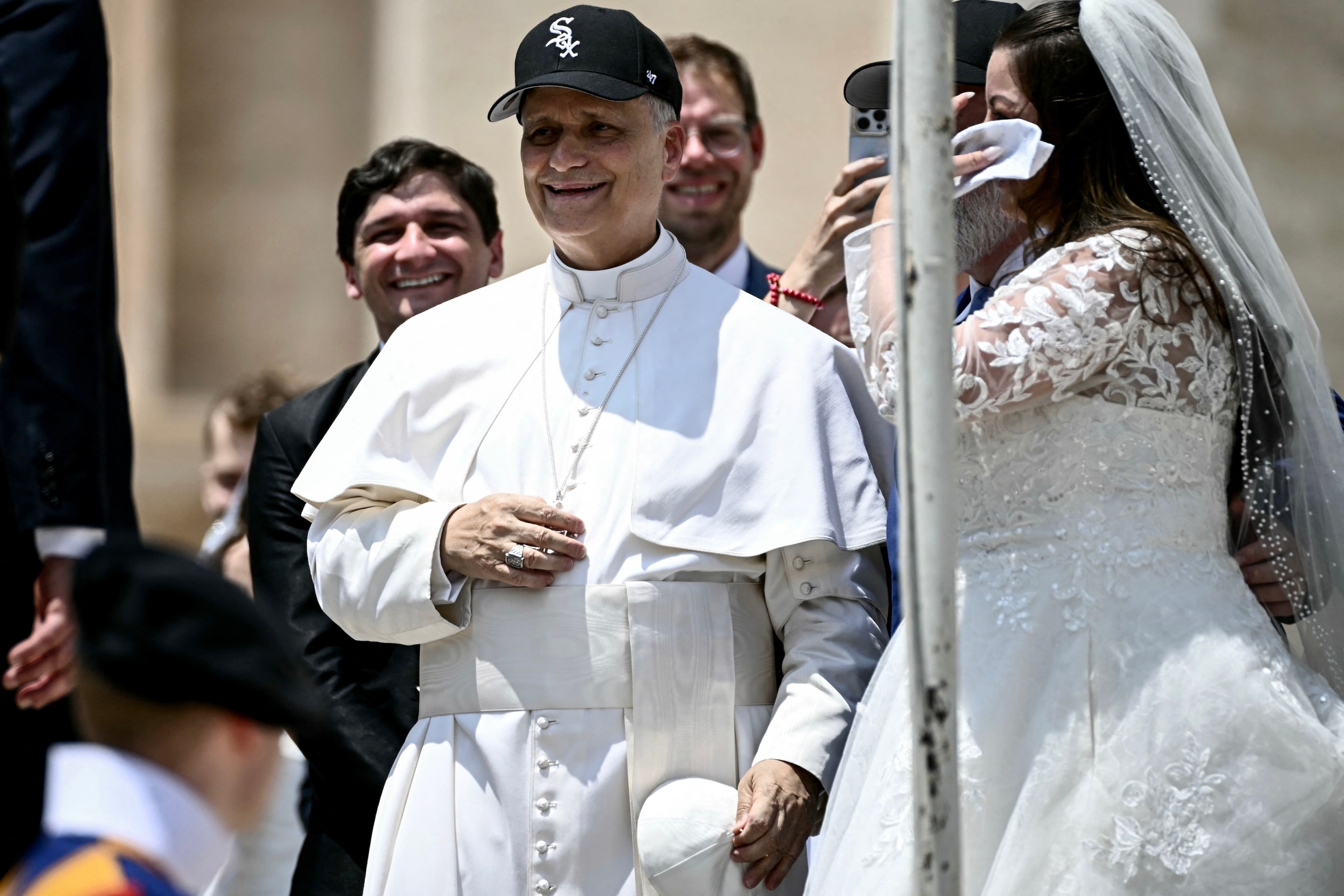The pattern was: The New York Knicks would scramble the length of the floor in desperation—frantic, wide-eyed, bolts rattling loose, spotting passing and dribbling lanes just as they snapped shut—in search of a bucket. When they got one, it scanned most credibly as an accident. Then, whether the Knicks got one or not, the Indiana Pacers would breeze unimpeded the other way and Tyrese Haliburton would create a wide-open, high-value shot for himself or somebody else within seven seconds. That pattern leads where anybody would expect it to go. The Pacers won Game 4 of the Eastern conference final Tuesday night, 130–121, and now lead the series three games to one.
When the Pacers wasted any tightly distributed handful of the approximately infinite good looks they enjoyed on the night, the Knicks could hang around, aided by 39 free-throw attempts and an unaccountable second-quarter stretch in which they wiped away a 10-point deficit and took a one-point lead with Delon Wright on the floor and Jalen Brunson off it. (Wright found time to commit a double-dribble violation in there, and played a shade under two minutes in the second half.) But the Pacers never relented so long that they couldn't just breeze back out to a multi-possession lead with 90 seconds of focus once they locked back in. Haliburton in particular delivered what's probably, given the circumstances, the best game of his career so far: 32 points, 15 assists, 12 rebounds, four steals, and not a single turnover, despite doing the vast bulk of Indiana's ball-handling and creating over his 38 minutes. Even as his shooting cooled off after a bonkers first quarter, he maintained Indiana's lunatic pace, kept the buzzsaw whirring, and sectioned New York's defense to toothpicks.
The Pacers, as they do, ran off of New York's misses, and off of New York's turnovers, and off of New York's makes, and out of timeouts, and all the time. So many open Indiana shots, particularly in the first and third quarters, resulted from two Knicks defenders, overwhelmed by the sheer pace at which the Pacers were making them do stuff, failing to organize coverage in transition or on a simple pick-and-roll, and both of them just ... abandoning the guy with the ball. That is not going to do it.
The Knicks got more or less fine performances from basically everybody from whom they needed them (with the possible exception, depending on how you grade his necessity to New York, of Mitchell Robinson, who couldn't handle the game's tempo at all and finished with more personal fouls [4] than defensive rebounds [2]). Brunson, harried in particular by Aaron Nesmith and more generally by Indiana's waves of inexhaustible ball defenders, started hot and then, as his legs wore out, gamely dark-arted his way to 12 free throws, and scored 31 points. OG Anunoby shot terribly from three but great from everywhere else; Mikal Bridges shot 2-for-10 from everywhere else but great from three. Karl-Anthony Towns powered New York's second-quarter outburst by driving to his left for baskets and trips to the free-throw line, over and over again; broadcast analyst Stan Van Gundy, equal parts dyspeptic and a coach by nature, got audibly exasperated by the Pacers continually failing to force Towns to his right hand, and it was funny.
But the Knicks simply are not precise enough to squeeze themselves and/or the ball through tiny, collapsing margins for 48 pressurized minutes against a faster, deeper, better-organized opponent. They committed 17 turnovers on the night—out of which only 922 came in the third quarter, all of them Josh Hart air-mailing an ill-advised alley-oop lob directly to Pascal Siakam—against Indiana's 11, which felt like three.
The Pacers have outscored the Knicks by a fairly measly 11 total points in amassing their 3–1 series lead, but the series has not felt that close, nor close at all. The Pacers are its actors: They are dictating all the terms and have all of the agency. The Knicks are not built for this. Even their purely theoretical path through the series demands nothing less than that they execute perfectly while also redlining on effort, for 48 straight minutes, in every game—to keep up with Indiana in the most literal running-from-one-end-of-the-court-to-the-other sense, and also in the figurative sense of racing to stay even an inch ahead of the steals-and-open-threes monster nipping at their heels from the tipoff. If there are teams that can do both of those things—maximum effort and perfect precision—simultaneously, for 48 minutes, for seven games in two weeks, bully for them, but they are not the New York Knicks. Their next-best hope is that they will make some ludicrous percentage of bad shots against an opponent sprinting into uncontested threes and layups at the other end. That is no hope at all.
The Pacers, meanwhile, need only continue doing what they always do. They aren't even doing it all that especially hard. The Pacers, that is to say, are the better basketball team. There's really no mistaking it.






